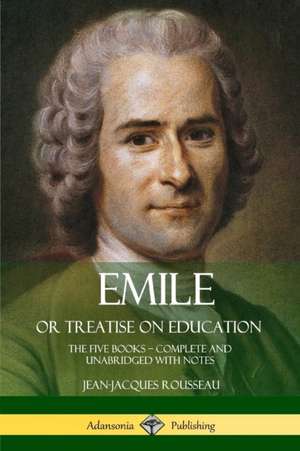Emile, or Treatise on Education
Autor Jean-Jacques Rousseauen Limba Engleză Paperback – 27 aug 2018
| Toate formatele și edițiile | Preț | Express |
|---|---|---|
| Paperback (1) | 167.56 lei 6-8 săpt. | |
| Lulu.Com – 27 aug 2018 | 167.56 lei 6-8 săpt. | |
| Hardback (1) | 265.51 lei 6-8 săpt. | |
| Lulu.Com – 27 aug 2018 | 265.51 lei 6-8 săpt. |
Preț: 167.56 lei
Nou
Puncte Express: 251
Preț estimativ în valută:
32.06€ • 33.48$ • 26.48£
32.06€ • 33.48$ • 26.48£
Carte tipărită la comandă
Livrare economică 15-29 aprilie
Preluare comenzi: 021 569.72.76
Specificații
ISBN-13: 9781387779758
ISBN-10: 1387779753
Pagini: 378
Dimensiuni: 152 x 229 x 22 mm
Greutate: 0.61 kg
Editura: Lulu.Com
ISBN-10: 1387779753
Pagini: 378
Dimensiuni: 152 x 229 x 22 mm
Greutate: 0.61 kg
Editura: Lulu.Com
Notă biografică
Jean-Jacques Rousseau (28 June 1712 - 2 July 1778) was a Genevan philosopher, writer and composer. His political philosophy influenced the progress of the Enlightenment throughout Europe, as well as aspects of the French Revolution and the development of modern political, economic and educational thought. His Discourse on Inequality and The Social Contract are cornerstones in modern political and social thought. Rousseau's sentimental novel Julie, or the New Heloise (1761) was important to the development of preromanticism and romanticism in fiction. His Emile, or On Education (1762) is an educational treatise on the place of the individual in society. Rousseau's autobiographical writings-the posthumously published Confessions (composed in 1769), which initiated the modern autobiography, and the unfinished Reveries of a Solitary Walker (composed 1776-1778)-exemplified the late-18th-century Age of Sensibility, and featured an increased focus on subjectivity and introspection that later characterized modern writing. Rousseau befriended fellow philosophy writer Denis Diderot in 1742, and would later write about Diderot's romantic troubles in his Confessions. During the period of the French Revolution, Rousseau was the most popular of the philosophers among members of the Jacobin Club. He was interred as a national hero in the Panthéon in Paris, in 1794, 16 years after his death.
